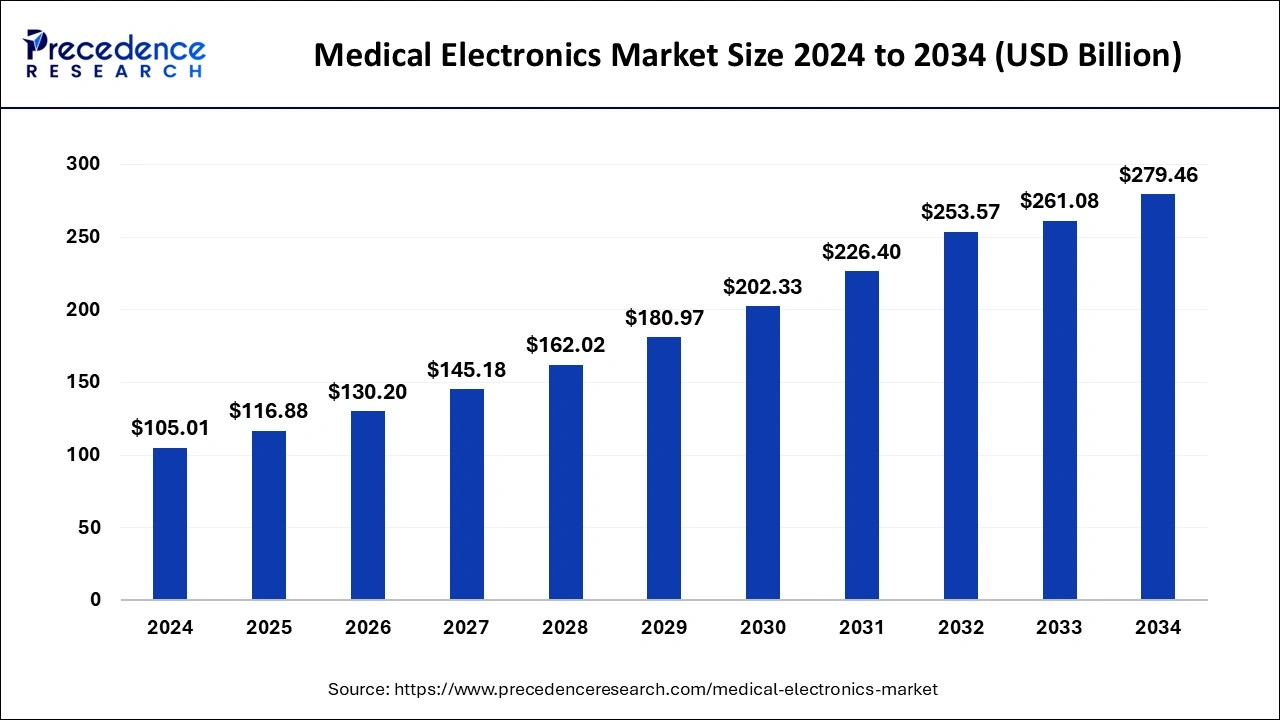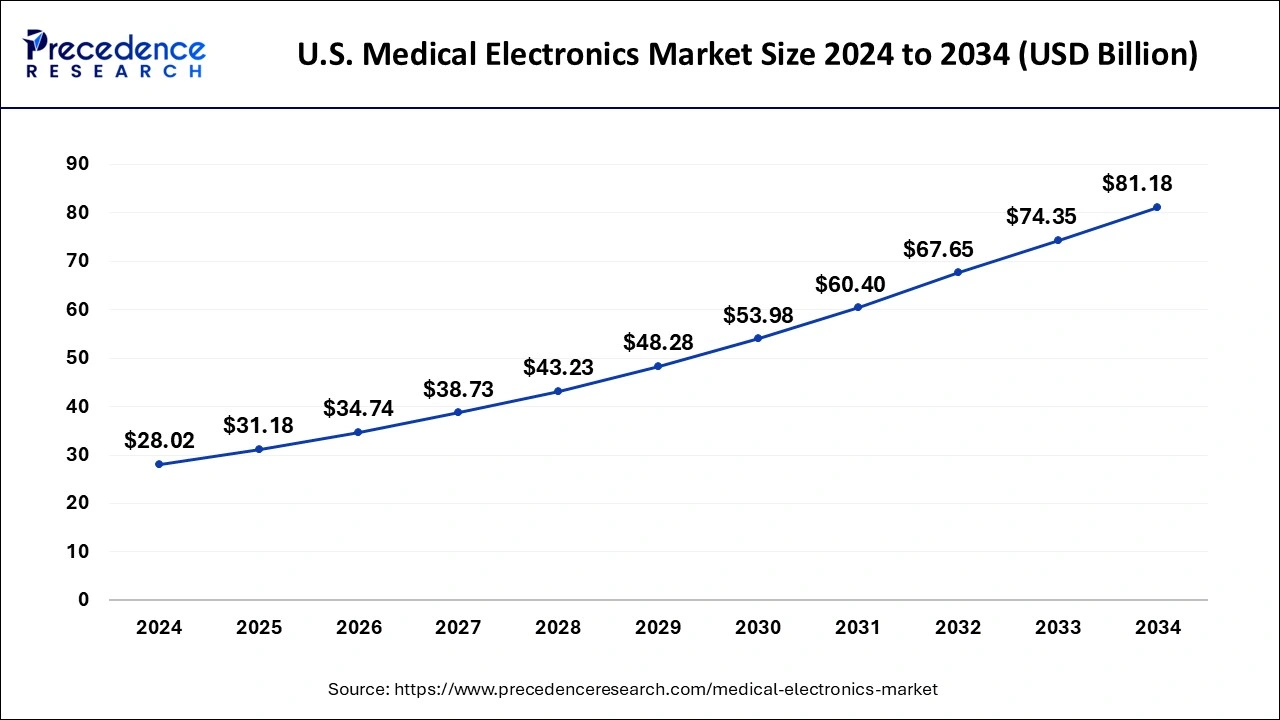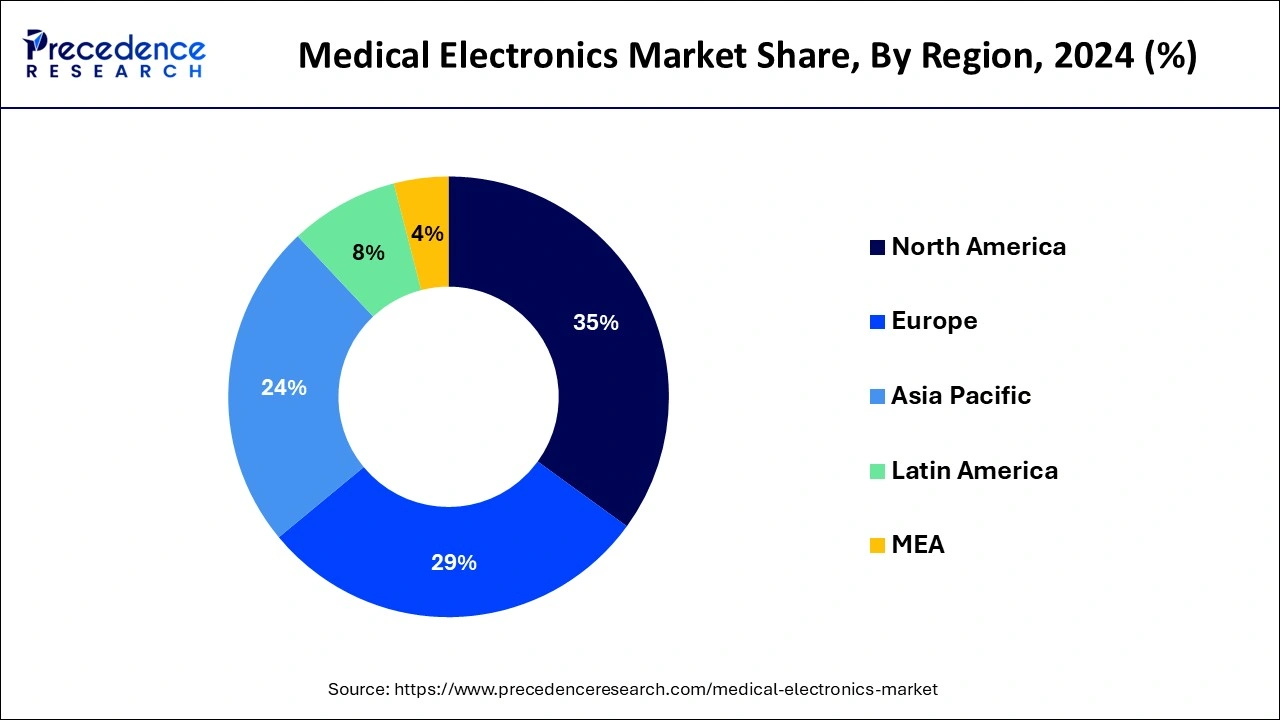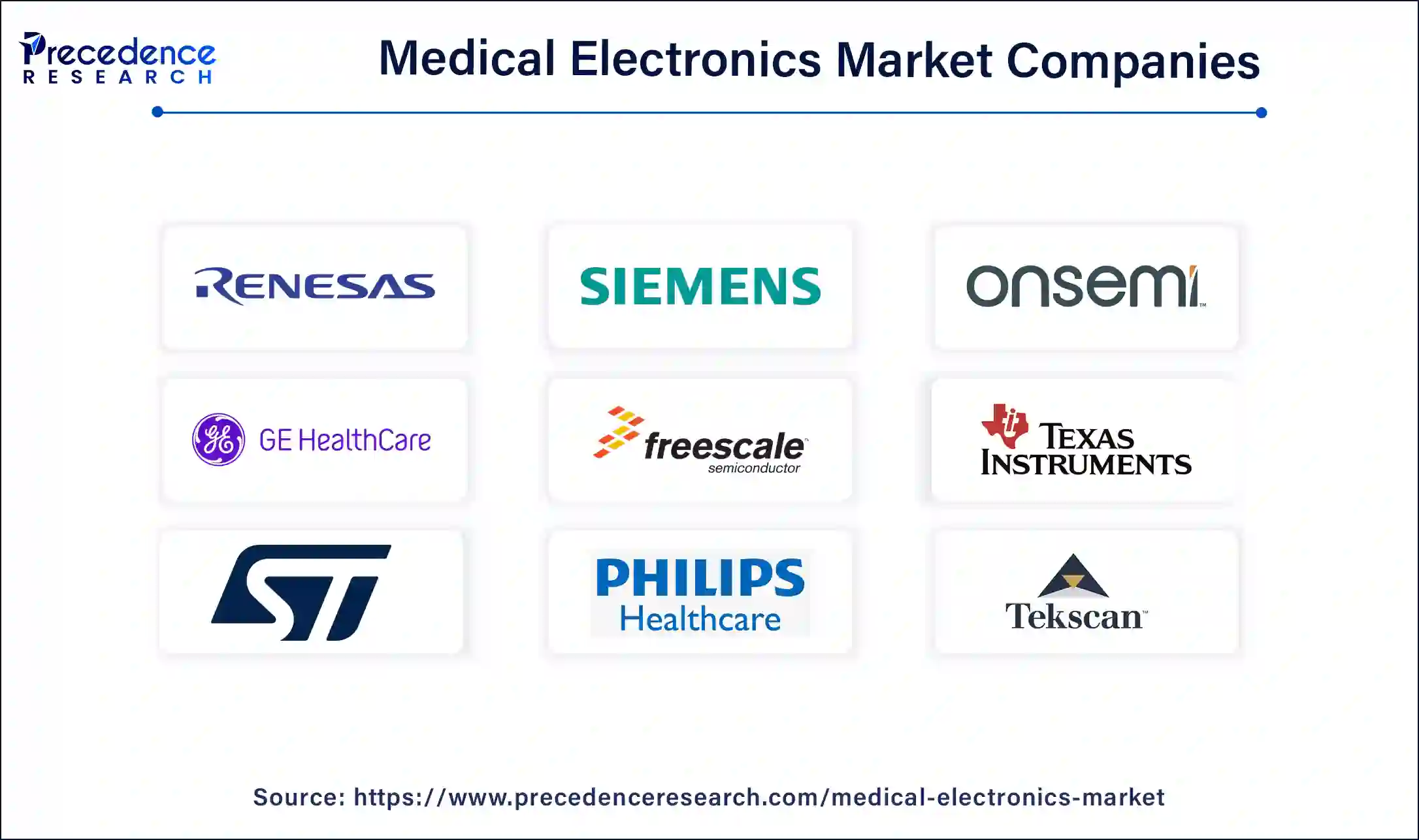Medical Electronics Market Size and Forecast 2025 to 2034
The global medical electronics market size was accounted for USD 105.01 billion in 2024 and is anticipated to reach around USD 279.46 billion by 2034, growing at a CAGR of 10.28% from 2025 to 2034.

Medical Electronics Market Key Takeaways
- North America led the global medical electronics market with the largest market share of 35% in 2024.
- Asia-Pacific is expected to expand at the fastest CAGR during the forecast period.
- By product, the therapeutics segment has held the biggest market share in 2024.
- By product, the diagnostics segment is anticipated to grow at a remarkable CAGR during the projected period.
- By application, the hospitals segment contributed the highest market share of 45% in 2024.
- By application, the homecare segment is estimated to expand at the fastest CAGR over the projected period.
How is AI enhancing the medical electronics industry?
Integrating AI into medical devices has reorganized healthcare by improving precision and efficiency. Advancements in algorithms and machine learning permit the monitoring of medical information, such as images, with unmatched accuracy. This, paired with automation, raises efficiency and removes the possibility of error.
AI is used in hospitals and other healthcare facilities to offer an efficient patient experience while making room to treat more patients daily. Some AI platforms target automating and prioritizing patient safety. These platforms can aid hospitals in better managing operational costs by tracking wait times and declining inpatient and emergency department length of stay.
U.S. Medical Electronics Market Size and Growth 2025 to 2034
The U.S. medical electronics market size was evaluated at USD 28.02 billion in 2024 and is predicted to be worth around USD 81.18 billion by 2034, rising at a CAGR of 11.22% from 2025 to 2034.

North America accounted for around 45% of the market share in 2022. The high disposable income, higher adoption of the electronic devices in healthcare industry, high healthcare expenditure, and improved access to healthcare facilities are the major factors that augmented the growth of the North America medical electronics market. The rising government and corporate investments in the development of the smart hospitals and efficient healthcare services is fueling the demand for the various medical electronics in the region.
United States
- In January 2024, Nanowear declared that its nanotechnology-enabled wearable and software platform, SimpleSense, has a clearance of FDA 510(k) for a novel AI-enabled Software-as-a-Medical Device (SaMD). As the first non-invasive, cuffless, continuous blood pressure monitors and diagnostic, SimpleSense-BP provides a transformational tool in the clinical diagnostic management of hypertension and is additive to the wearable platform's previously cleared cardiopulmonary diagnostics.

On the other hand, Asia Pacific is estimated to be the most opportunistic segment during the forecast period. The rapidly growing geriatric population is expected to boost the demand for the advanced medical electronics in the forthcoming years. According to the World Health Organization, 80% of the geriatric population in the globe will be living in the low and middle-income countries by 2050. The countries like South Korea, China, and India are attracting FDIs of the healthcare industry players and the rising government investments in the development of the smart and technologically advanced healthcare infrastructure is fueling the growth of the medical electronics market in Asia Pacific region.
India
- In June 2024, The Patient Safety and Access Initiative of India Foundation, a Delhi-based not-for-profit organization committed to improving healthcare access and quality, filed a Public Interest Litigation (PIL) with the Delhi High Court. The PIL raises critical concerns about the lax regulatory framework overseeing the quality, safety, and efficacy of imported second-hand or refurbished medical devices in India.
Medical Electronics Market Growth Factors
The global medical electronics market is primarily driven by the rising prevalence of various chronic diseases and growing geriatric population across the globe. The chronic diseases such as diabetes, cancer, cardiovascular diseases, and COPD are the major factors responsible for the increasing adoption of the medical electronics. According to the United Nations, the global geriatric population was estimated at around 382 million (aged 60 years and above) in 2017 and this number is projected to reach at 2.1 billion by 2050. The geriatric people are more prone to the various chronic diseases and hence boosts the demand for various diagnostics and therapeutics medical electronic devices such as CT scanner, ultrasound, patient monitoring systems, medical implantable devices, pacemakers, and respiratory care devices. Furthermore, the rising number of ICU admissions is fueling the growth of the global medical electronics market. According to the Society of Critical Care Medicine, almost 40 to 50% of the ICU admissions require ventilators, which fosters the growth of the medical electronics. The availability of wider range of diagnostic and therapeutic devices coupled with the rising government and corporate investments to equip the hospitals with digital and electronic equipment across the globe is a significant growth driver of the market.
The surging uses of the diagnostic devices such as ultrasound equipment, CT scanners, and X-Rays in the diagnosis of various diseases and bones related issues has significantly driven the market growth in the past. Moreover, the rising investments in the research has led to the integration of the latest technologies like artificial intelligence (AI) with the various medical electronics. The technological advancements helps the healthcare units to offer enhanced patient care services and increases the patients conveniences and results in improved customer experiences in any healthcare setting. The rising demand for the early detection and treatment of the disease among the population and rising popularity of the minimal-invasive surgeries is propelling the demand for the various medical electronics across the globe that fosters the growth of the medical electronics market.
Market Scope
| Report Coverage | Details |
| Market Size in 2025 | USD 116.88 Billion |
| Market Size by 2034 | USD 279.46 Billion |
| Growth Rate from 2025 to 2034 | CAGR of 10.28% |
| Largest Market | North America |
| Base Year | 2024 |
| Forecast Period | 2025 to 2034 |
| Segments Covered | |
| Regions Covered | North America, Europe, Asia-Pacific, Latin America, and Middle East & Africa |
Product Insights
The therapeutics segment dominated the global medical electronics market in 2024, in terms of revenue and is estimated to sustain its dominance during the forecast period. This is attributed to the extensive demand for the therapeutic devices such as medical implantable devices, pacemakers, surgical robots, and respiratory care devices. The surging prevalence of the cardiovascular diseases, neurological disorders, and chronic respiratory diseases is expected to further fuel the growth of the therapeutics segment during the forecast period. According to the World Health Organization, cardiovascular diseases are among the top causes of deaths that accounts for around 32% of the global deaths.
On the other hand, the diagnostics segment is estimated to be the most opportunistic segment during the forecast period. The rising awareness amongst the population regarding the benefits of the early detection of the diseases is augmenting the growth of this segment. The rising penetration of the diagnostic centers and hospitals coupled with the rising prevalence of various diseases is expected to drive the demand for the diagnostic medical electronics such as ultrasound equipment, X-Rays, and MRI scanners.
Application Insights
The hospitals segment contributed the highest market share of 45% in 2024. The rising number of hospital admissions owing to various factors like growing incidences of CVDs, neurological disorders, growing incidences of road traffic accidents, and rising geriatric population. The increasing investments in the development of multi-specialty hospitals and equipping them with advanced medical equipment is a major factor that has significantly boosted the growth of the hospitals in the medical electronics market.
On the other hand, the homecare is expected to be the fastest-growing segment during the forecast period. The rising disposable income, rising healthcare expenditure, and increasing awareness regarding the hospital acquired infections is resulting in an increased adoption of the homecare healthcare services. The rising demand for receiving healthcare services at the comfort of the home is significantly augmenting the demand for the homecare medical electronics across the globe.
Medical Electronics Market Companies

- Renesas Electronics Corporation
- Siemens AG
- ON Semiconductor Corporation
- GE Healthcare
- Freescale Semiconductor Inc.
- Texas Instruments Incorporated
- STMicroelectronics N.V.
- Philips Healthcare Pvt. Ltd.
- Tekscan, Inc.
- NXP Semiconductors N.V.
Latest announcements by industry leaders
- In July 2024, Clarivate Plc, global provider of transformative intelligence, declared the release of the MedTech Trends to Watch 2024 report, the second installment in a two-part series providing a predictive analysis of emerging trends shaping the MedTech industry.
Recent developments
- In July 2024, Royal Philipsa disclosed Cardiac Workstation, a groundbreaking new cardiac care platform designed to accelerate clinical decision-making and care for cardiology patients, in Europe, Middle East and Africa. The Cardiac Workstation uses advanced algorithms to access, analyze, and manage electrocardiograph (ECG) data remotely or at the point of care.
- In July 2023, AccurKardia, a medical technology firm delivering clinical-grade ECG interpretation software, declared that its flagship product, the AccurECG Analysis System, has been granted FDA 510(k) clearance. AccurECG is a cloud-based, device-agnostic, fully automated electrocardiogram (ECG) interpretation software platform.
- In April 2023, Garmin declared expanded regional availability of the Dexcom Connect IQ apps, offering individual with Type 1 and Type 2 diabetes who use a Dexcom G6 or Dexcom G7 Glucose Monitoring System a way to see their glucose levels and trends quickly, even while working out, right on their compatible Garmin smartwatch or cycling computer.
Segments Covered in the Report
By Product
- Therapeutics
- Implantable Medical Devices
- Surgical Robots
- Pacemakers
- Neuro stimulation Devices
- Respiratory Care Devices
- Diagnostics
- CT/PET Devices
- Patient Monitoring Devices
- Ultrasound Devices
- X-Ray Devices
- MRI Scanners
- CT Scanners
- Others
- Others
By Application
- Hospitals
- Ambulatory Centers
- Homecare
- Others
By Geography
- North America
- U.S.
- Canada
- Europe
- U.K.
- Germany
- France
- Asia Pacific
- China
- India
- Japan
- South Korea
- Rest of the World
 Get a Sample
Get a Sample
 Table Of Content
Table Of Content